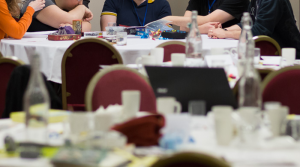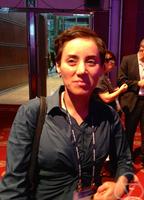 It was with trepidation that I booked tickets for the MathsJam Gathering in 2015. I loved the sound of the event, but what if everyone else was cleverer than me? What if people thought I was a fraud because I wasn’t an academic? What if nobody talked to me? I needn’t have worried. MathsJam is one of the friendliest, most welcoming events I’ve ever experienced. Lots of people talked to me, I learned new things, I laughed a lot. I’ve since been to two more gatherings, and have already booked for the next one in November.
It was with trepidation that I booked tickets for the MathsJam Gathering in 2015. I loved the sound of the event, but what if everyone else was cleverer than me? What if people thought I was a fraud because I wasn’t an academic? What if nobody talked to me? I needn’t have worried. MathsJam is one of the friendliest, most welcoming events I’ve ever experienced. Lots of people talked to me, I learned new things, I laughed a lot. I’ve since been to two more gatherings, and have already booked for the next one in November.
You're reading: Events
How to join in with our distributed Wiki edit day
 You may have seen our post last month about our remote Wiki Editing Day, this coming Saturday 12th May. We’re hoping to get a bunch of people in different locations editing pages on Wikiquote and other Wikimedia sites, to improve the visibility of female mathematicians. Here’s how you can get involved.
You may have seen our post last month about our remote Wiki Editing Day, this coming Saturday 12th May. We’re hoping to get a bunch of people in different locations editing pages on Wikiquote and other Wikimedia sites, to improve the visibility of female mathematicians. Here’s how you can get involved.
Wikiquote edit-a-thon – Saturday, May 12th, 2018
TL;DR: We’re holding a distributed Wikipedia edit-a-thon on Saturday, May 12th, 2018 from 10am to improve the visibility of women mathematicians on the Wikiquotes Mathematics page. Join in from wherever you are! Details below, and in this Google Doc.
Extension and abstraction without apparent direction or purpose is fundamental to the discipline. Applicability is not the reason we work, and plenty that is not applicable contributes to the beauty and magnificence of our subject.
– Peter Rowlett, “The unplanned impact of mathematics”, Nature 475, 2011, pp. 166-169.Trying to solve real-world problems, researchers often discover that the tools they need were developed years, decades or even centuries earlier by mathematicians with no prospect of, or care for, applicability.
– Peter Rowlett, “The unplanned impact of mathematics”, Nature 475, 2011, pp. 166-169.There is no way to guarantee in advance what pure mathematics will later find application. We can only let the process of curiosity and abstraction take place, let mathematicians obsessively take results to their logical extremes, leaving relevance far behind, and wait to see which topics turn out to be extremely useful. If not, when the challenges of the future arrive, we won’t have the right piece of seemingly pointless mathematics to hand.
Peter Rowlett, “The unplanned impact of mathematics”, Nature 475, 2011, pp. 166-169.
Now, don’t get me wrong. I have every admiration for Peter and his work; his is a thoughtful voice of reason, and it’s not at all unreasonable for the Wikiquote page on mathematics to cite his writing.
LMS Meeting in honour of Maryam Mirzakhani

The London Mathematical Society are organising an event later this month in honour of the late Fields Medalist Maryam Mirzakhani. It's at the University of Warwick on 22nd March, and will include talks outlining some of Mirzakhani's work, followed by a drinks reception and dinner. The event is part of a larger EPSRC symposium on Teichmüller dynamics.
Black Mathematician Month: Closing Ceremony
Below is an article marking the end of Black Mathematician Month, written by the team at UCL. We’ve been participating in the project too, and we’ve found it a great opportunity to invite new authors to write for our site and to showcase black mathematicians from the UK and elsewhere. We’ve posted several articles during the month, and hope to continue to feature more diverse authors on the site going forward, with a few more posts anticipated soon.
To mark the end of the month, Dr Nira Chamberlain gave a lecture yesterday at UCL, and if you missed it, the event live-stream will be posted on the Chalkdust social media: Facebook / Twitter
Ditching the fifth axiom (video)
Watch geometer/topologist Caleb Ashley explain the parallel postulate on Numberphile.
Stirling’s numbers in a nutshell
This is a guest post by researcher Audace Dossou-Olory of Stellenbosch University, South Africa.
In assignment problems, one wants to find an optimal and efficient way to assign objects of a given set to objects of another given set. An assignment can be regarded as a bijective map $\pi$ between two finite sets $E$ and $F$ of $n\geq 1$ elements. By identifying the sets $E$ and $F$ with $\{1,2,\ldots, n\}$, we can represent an assignment by a permutation.